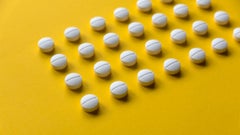
Januvia
Januvia (sitagliptin) is a prescription medication that helps lower blood sugar in adults with Type 2 diabetes. It works best when you also follow a balanced diet and exercise regularly. It belongs to the drug class called dipeptidyl peptidase-4 (DPP-4) inhibitors, or gliptins. Januvia (sitagliptin) comes as a tablet you take by mouth once a day. Side effects include stuffy or runny nose and headache. Januvia (sitagliptin) is a brand-name medication only; the generic version isn't available yet.

What is Januvia (sitagliptin)?
What is Januvia (sitagliptin) used for?
Type 2 diabetes in adults
How Januvia (sitagliptin) works
Januvia (sitagliptin) is a dipeptidyl peptidase-4 (DPP-4) inhibitor. It blocks a protein in the body called DPP-4 from working. This helps insulin stick around in your body longer. It also stops your body from making glucagon, a hormone that raises blood sugar. Together, this helps control your blood sugar levels.
Drug Facts
More on Januvia (sitagliptin) essentials

Get your GoodRx coupon

What are the side effects of Januvia (sitagliptin)?
Common Side Effects
- Runny or stuffy nose and other symptoms of the common cold (5%)
Other Side Effects
- Headache
Serious Side Effects
- Pancreatitis: upper stomach pain, fever, nausea, vomiting, yellow skin or eyes
- Heart problems: sudden weight gain; trouble breathing; unusual tiredness; swelling in the feet, ankles, or legs
- Sudden kidney problems: not urinating, swelling in legs or ankles, feeling tired, trouble breathing, confusion, nausea
- Severe skin reaction or allergic reaction: rash, blisters, sores, trouble breathing, swelling
Source: DailyMed
More on Januvia (sitagliptin) side effects
The following side effects have also been reported
Along with its needed effects, a medicine may cause some unwanted effects. Although not all of these side effects may occur, if they do occur they may need medical attention.
Check with your doctor immediately if any of the following side effects occur:
Less common
blurred vision
chills
cold sweats
confusion
cool, pale skin
dizziness
fast heartbeat
headache
increased hunger
loss of consciousness
nightmares
seizures
shakiness
slurred speech
unusual tiredness or weakness
Incidence not known
Blistering, peeling, loosening of the skin
hives or welts, itching, or skin rash
large, hive-like swelling on the face, eyelids, lips, tongue, throat, hands, legs, feet, or sex organs
loss of appetite
pains in the stomach, side, or abdomen, possibly radiating to the back
puffiness or swelling of the eyelids or around the eyes, face, lips, or tongue
red skin lesions, often with a purple center
redness of the skin
severe joint pain
sores, ulcers, or white spots in the mouth or on the lips
vomiting
Some side effects may occur that usually do not need medical attention. These side effects may go away during treatment as your body adjusts to the medicine. Also, your health care professional may be able to tell you about ways to prevent or reduce some of these side effects. Check with your health care professional if any of the following side effects continue or are bothersome or if you have any questions about them:
More common
Body aches or pain
difficulty with breathing
ear congestion
loss of voice
muscle aches
stuffy or runny nose
Other side effects not listed may also occur in some patients. If you notice any other effects, check with your healthcare professional.
Call your doctor for medical advice about side effects. You may report side effects to the FDA at 1-800-FDA-1088.

Pros and cons of Januvia (sitagliptin)

Pharmacist tips for Januvia (sitagliptin)

Take Januvia (sitagliptin) every day with or without food. Choose a time that works best for you and try to stick to the same time each time. This can be helpful for remembering to take your medication every day.
Swallow Januvia (sitagliptin) whole with water. Don't cut the tablets in half. They don't have a score line down the middle to help you cut it. It's generally not recommended to cut unscored tablets. You might not get even halves and you might hurt yourself. Talk to your prescriber if you have trouble swallowing the tablet whole.
It's best to avoid alcohol when possible while taking Januvia (sitagliptin). Drinking alcohol can lower your blood sugar when you have diabetes. Drinking too much can also raise your risk of pancreatitis, which could also happen with this medication. If you drink alcohol often and have trouble cutting back, ask a healthcare professional for help.
Be sure you know how to look for signs of low blood sugar, especially if you're taking Januvia (sitagliptin) with other diabetes medications like insulin or glipizide, If you feel shaky, confused, or have a fast heartbeat, check your blood sugar. If your blood sugar is low, drink half a cup of fruit juice or take 4 glucose tablets to help treat it.
Talk to your care team about ways to plan nutritious meals and exercise regularly. This helps you get the most out of your treatment and keep your blood sugar under control.
More on Januvia (sitagliptin) tips

Frequently asked questions about Januvia (sitagliptin)

How to save using GoodRx




What are the risks and warnings for Januvia (sitagliptin)?
Januvia (sitagliptin) can cause some serious health issues. This risk may be even higher for certain groups. If this worries you, talk to your doctor or pharmacist about other options.

Inflammation of the pancreas (pancreatitis)
Although rare, a few people who took Januvia (sitagliptin) have had pancreatitis, which means the pancreas gets inflamed. It's not clear if people who've had pancreatitis before are more likely to get it again with this medication. Be sure to let your prescriber know if you've had it in the past.
Stop taking Januvia (sitagliptin) and call your prescriber right away if you have signs of pancreatitis. Watch for upper stomach pain that spreads to your back and doesn't go away. You also might have a fever, nausea, or vomiting.

Risk of heart failure
Risk factors: Heart failure | Heart problems | Kidney problems
In a study, some people with Type 2 diabetes and heart disease who took a medication like Januvia (sitagliptin) developed heart failure. It's not clear if Januvia (sitagliptin) has the same risk.
Before starting Januvia (sitagliptin), tell your prescriber about your full medical history, especially if you have heart or kidney problems. They can check your risk of heart failure.
Get medical help right away if you have signs of heart failure while taking Januvia (sitagliptin). This includes trouble breathing, feeling very tired, swelling in your body, or sudden weight gain.

Sudden kidney problems
Risk factors: History of kidney problems | Taking a higher-than-recommended dose of Januvia (sitagliptin)
Few people who took Januvia (sitagliptin) had sudden kidney injury. Sometimes, they needed dialysis.
Before starting Januvia (sitagliptin), your prescriber might order blood work to check your kidneys. They'll also check your kidneys from time to time during treatment. If you get any kidney problems, your prescriber might lower your dose or ask you to stop taking it.
Talk to your care team if you're urinating less than usual while taking Januvia (sitagliptin). This can be a sign of a kidney problem.

Low blood sugar when taken with other diabetes medications
Risk factors: Also using insulin | Also taking sulfonylureas like glipizide
There's a higher chance of having low blood sugar (hypoglycemia) if you take Januvia (sitagliptin) with certain other diabetes medications. This is mainly if you also use insulin or take sulfonylureas like glipizide. Very low blood sugar can be life-threatening.
Symptoms of low blood sugar include feeling shaky, very hungry, confused, or weak. You also might be nervous or anxious, have a fast heartbeat, or sweat. Be sure you know how to spot and treat low blood sugar. Talk to your care team if you're worried about low blood sugar while taking Januvia (sitagliptin).

Serious allergic reactions
Risk factor: Allergy to DPP-4 inhibitors (also called "gliptins")
Some people can have a serious allergic reaction to Januvia (sitagliptin). It can look like a rash, peeling or blistering skin, swelling of the face or lips, or trouble breathing. There could also be other signs of anaphylaxis. Reactions can happen within the first 3 months of starting the medication. If this happens, stop taking Januvia (sitagliptin) and get medical care right away.
Tell your prescriber if you've had an allergic reaction to other DPP-4 inhibitors like Tradjenta (linagliptin) or alogliptin (Nesina). You might be more likely to react to Januvia (sitagliptin).

Joint pain
Some people who take DPP-4 inhibitors like Januvia (sitagliptin) have had severe joint pain. This can happen anytime from a day to many years after starting the medication. For most people, the pain goes away after they stop the medication. If you have any discomfort in your joints, speak to your care team right away.

Severe skin reactions
Some people taking Januvia (sitagliptin) have had a skin problem called bullous pemphigoid. It can cause itchy skin, blistering rash, or sores. These usually go away once you stop taking the medication and get treated.
If you notice a rash with blisters or itchy skin, talk to a healthcare professional. You might need to stop taking Januvia (sitagliptin) and see a dermatologist.
More on Januvia (sitagliptin) warnings

Januvia (sitagliptin) dosage forms
Typical dosing for Januvia (sitagliptin)
The typical dose is 100 mg by mouth once daily.
Your dose might differ if you have kidney problems.
More on Januvia (sitagliptin) dosage forms

Interactions between Januvia (sitagliptin) and other drugs
Using this medicine with any of the following medicines is usually not recommended, but may be required in some cases. If both medicines are prescribed together, your doctor may change the dose or how often you use one or both of the medicines.
- Acarbose
- Balofloxacin
- Besifloxacin
- Chloroquine
- Chlorpropamide
- Ciprofloxacin
- Enoxacin
- Fleroxacin
- Flumequine
- Gatifloxacin
- Gemifloxacin
- Glimepiride
- Glipizide
- Glyburide
- Hydroxychloroquine
- Lanreotide
- Levofloxacin
- Lomefloxacin
- Metformin
- Moxifloxacin
- Nadifloxacin
- Nateglinide
- Norfloxacin
- Octreotide
- Ofloxacin
- Pasireotide
- Pazufloxacin
- Pefloxacin
- Prulifloxacin
- Repaglinide
- Rufloxacin
- Simeprevir
- Sparfloxacin
- Thioctic Acid
- Tolazamide
- Tolbutamide
- Tosufloxacin
Using this medicine with any of the following medicines may cause an increased risk of certain side effects, but using both drugs may be the best treatment for you. If both medicines are prescribed together, your doctor may change the dose or how often you use one or both of the medicines.
- Acebutolol
- Atenolol
- Betaxolol
- Bisoprolol
- Carteolol
- Carvedilol
- Celiprolol
- Esmolol
- Labetalol
- Levobunolol
- Metipranolol
- Metoprolol
- Nadolol
- Nebivolol
- Oxprenolol
- Penbutolol
- Pindolol
- Practolol
- Propranolol
- Sotalol
- Timolol

How much does Januvia (sitagliptin) cost?

What are alternatives to Januvia (sitagliptin)?
Improve blood sugar levels in adults with Type 2 diabetes (as an add-on to a nutritious diet and exercise routine)

What is the latest news about Januvia (sitagliptin)?

Januvia (sitagliptin) images
Get savings updates for Januvia (sitagliptin)
Receive price alerts, news, and other messages from GoodRx about Januvia (sitagliptin) and other healthcare topics and relevant savings offers.By providing your email, you consent to receive marketing communications from GoodRx, which may include content and/or data related to men’s health, women's health, reproductive care, or sexual health. You agree to the GoodRx Terms of Use and acknowledge the Privacy Policy. You can unsubscribe at any time.
References
Best studies we foundAmerican Heart Association. (2025). Risks for and causes of heart failure.
Centers for Disease Control and Prevention. (2024). Treatment of low blood sugar (hypoglycemia).
Dicker, D. (2011). DPP-4 inhibitors: Impact on glycemic control and cardiovascular risk factors. Diabetes Care.
Merck Sharp & Dohme LLC. (2024). Januvia- sitagliptin tablet, film coated [package insert]. DailyMed.
National Kidney Foundation. (2024). Acute kidney injury (AKI).
U.S. Food and Drug Administration. (2016). FDA Drug Safety Communication: FDA warns that DPP-4 inhibitors for type 2 diabetes may cause severe joint pain.
White, W. B., et al. (2013). Alogliptin after acute coronary syndrome in patients with type 2 diabetes. The New England Journal of Medicine.
You and Your Hormones. (2021). Glucagon.
You and Your Hormones. (2021). Insulin.
Compare other Diabetes Type 2 drugs
Browse medications
View AllResearch prescriptions and over-the-counter medications from A to Z, compare drug prices, and start saving.





















